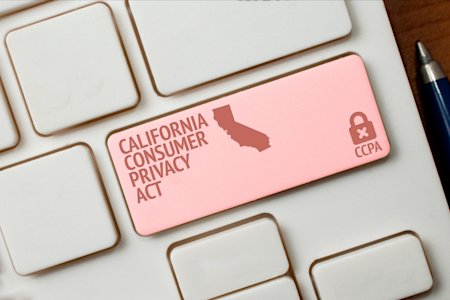The California Consumer Privacy Act (CCPA) has transformed data privacy in the U.S., granting California residents new rights over their personal information and placing strict requirements on businesses handling this data. As data privacy becomes a priority for consumers, ensuring CCPA compliance is essential—not only to avoid penalties but also to build trust with customers.
In this article, we’ll explore what CCPA compliance entails, outline the steps to become compliant, and show how Splashtop’s secure remote access solutions can help your business meet CCPA standards efficiently.
What is CCPA Compliance?
The California Consumer Privacy Act (CCPA) is a privacy law that grants California residents specific rights regarding their personal data, including access, deletion, and the ability to opt-out of data sales. CCPA compliance requires businesses to follow these guidelines to protect consumer privacy and meet legal requirements. This act serves as a key regulatory measure, ensuring that businesses handle data responsibly and transparently.
Examples of CCPA Compliance
Achieving CCPA compliance involves concrete actions that prioritize consumer data protection and transparency. For example, a retail company might adjust its data collection practices to provide customers with clear information about how their personal data will be used and stored. This company could also implement a simple online portal where customers can easily opt out of having their data sold to third parties—one of the core rights granted by the CCPA.
In another case, a technology firm might take a proactive approach by setting up a dedicated privacy team responsible for managing and responding to consumer requests regarding their personal information. This could involve creating automated systems for handling data access and deletion requests, allowing consumers to see what data the company holds about them and delete it if they choose. This system not only facilitates CCPA compliance but also enhances customer trust by offering a transparent and efficient way to exercise their rights.
A health services provider, for instance, could embed privacy notifications within their digital platform, informing users of their rights under the CCPA each time they interact with the platform. By frequently reminding users of their rights, this approach keeps customers aware of their control over their personal data and helps ensure the provider stays within CCPA guidelines.
Another example is a managed service provider (MSP) that handles IT compliance for multiple clients, including ensuring adherence to privacy regulations like the CCPA. By following a structured compliance process—such as performing regular audits, securing access, and responding promptly to data requests—the MSP helps clients meet regulatory requirements while safeguarding consumer privacy.
These examples highlight how companies in diverse industries are applying practical measures to uphold the principles of the California Consumer Privacy Act. Through clear communication, automated compliance tools, and dedicated data privacy teams, businesses are making compliance a core part of their operations, creating a safer digital experience for consumers.
Who Must Comply with the California Consumer Privacy Act?
The CCPA applies to certain businesses that collect, use, or share personal data of California residents, but it’s not limited to companies physically located in California. Instead, compliance is required based on specific criteria regarding revenue, data handling, and business scope. Here are the main thresholds that determine if a business must adhere to the CCPA:
Annual Revenue: Businesses with gross annual revenue exceeding $25 million are required to comply with the CCPA. This provision aims to ensure that large companies with substantial resources adhere to strict data privacy standards.
Data Volume: Companies that buy, receive, sell, or share personal information from at least 50,000 California residents, households, or devices each year must also comply. This threshold includes many online platforms and service providers, particularly those who rely on user data for targeted advertising or analytics.
Revenue from Data Sales: If a business earns at least 50% of its annual revenue from selling California residents' personal data, it must comply with the CCPA. This criterion particularly affects companies in data-driven industries, like advertising and digital marketing, where consumer data monetization is a core part of their revenue model.
In addition to these criteria, it’s important to note that businesses of all sizes and types may voluntarily choose to adopt CCPA-compliant practices, even if they aren’t technically required to do so. Such companies often do this to build trust with consumers or prepare for future legislation as data privacy laws expand globally.
Key Provisions and Consumer Rights Under the CCPA
The California Consumer Privacy Act grants California residents specific rights over their personal data, empowering them with more control over how their information is collected, used, and shared. Below are the main provisions of the CCPA, outlining each consumer right:
Right to Access Information
Consumers have the right to request that a business disclose the personal information it has collected about them over the past 12 months. This includes knowing the categories of data collected, the sources of that data, the business purposes for collecting it, and any third parties with whom the information was shared.Right to Deletion of Personal Information
The CCPA provides consumers with the right to request the deletion of their personal data. Once a request is made, businesses are obligated to delete the requested information unless specific exceptions apply, such as compliance with legal obligations or maintaining data for internal purposes like detecting security incidents.Right to Opt-Out of Data Sales
Consumers have the right to opt out of the sale of their personal information. To facilitate this, businesses that sell data are required to include a clear "Do Not Sell My Personal Information" link on their website, making it easy for consumers to exercise this right.Right to Non-Discrimination
The CCPA prohibits businesses from discriminating against consumers who exercise their rights under the Act. This means a business cannot deny goods or services, charge different prices, or provide a different quality of service solely because a consumer opted out of data collection or requested data deletion.Right to Know About Data Sharing for Business or Commercial Purposes
Under the CCPA, consumers have the right to know if their personal information is being shared for business or commercial purposes, including the categories of information shared and the types of entities with whom it was shared. This right provides further transparency and allows consumers to make informed decisions regarding their data.
These rights collectively enhance consumer control and transparency around data practices, allowing individuals to manage their personal data in a way that aligns with their privacy preferences. Through these provisions, the CCPA sets a strong foundation for consumer rights, establishing key expectations for businesses handling California residents' personal information.
CCPA Penalties for Non-Compliance
Businesses that fail to comply with the California Consumer Privacy Act (CCPA) can face significant penalties, impacting both their finances and reputation. The CCPA includes strict enforcement mechanisms to ensure businesses uphold consumer privacy rights, with penalties structured as follows:
Civil Penalties
For unintentional violations, businesses are given a 30-day period to address and correct any issues after being notified. If a business fails to resolve the non-compliance within this period, they may incur civil penalties of up to $2,500 per violation. For intentional violations, the fine increases to $7,500 per violation. Given that each instance of non-compliance, such as failing to respond to a data request, counts as a separate violation, the potential fines can add up quickly.Private Right of Action for Data Breaches
The CCPA also grants California residents the right to file a lawsuit if their personal information is compromised in a data breach resulting from a business’s failure to implement reasonable security measures. Consumers can seek damages ranging from $100 to $750 per incident or higher if they can demonstrate additional damages. This provision means that a data breach affecting many consumers could lead to substantial financial consequences for the business involved.Reputational Impact
Beyond financial penalties, CCPA non-compliance can damage a company’s reputation. Failing to protect consumer data or uphold privacy rights can lead to loss of customer trust, especially in today’s privacy-conscious environment. Negative publicity resulting from a CCPA violation or data breach can reduce consumer confidence, potentially impacting customer loyalty and long-term business success.
The California Attorney General’s office is responsible for enforcing the CCPA, and as data privacy laws gain momentum, businesses can expect heightened scrutiny of their data handling practices. Consequently, ensuring CCPA compliance is not only essential to avoid penalties but also critical for maintaining customer trust and a positive public image.
How to Become CCPA Compliant (Checklist)
Achieving CCPA compliance requires businesses to adopt several key practices and processes that protect consumer privacy. Below are the essential steps companies should take to ensure they meet CCPA requirements:
1. Assess Data Collection Practices
The first step towards CCPA compliance is conducting a thorough audit of all data collection practices. This includes identifying what personal information is collected, how it is used, where it is stored, and with whom it is shared. Businesses should document data sources and maintain records of all personal information to ensure transparency and control.
2. Update Privacy Policies
CCPA compliance requires that businesses maintain clear and comprehensive privacy policies. These policies should detail the types of personal information collected, the purpose of collection, and consumers' rights under the CCPA. Regularly review and update your privacy policy to reflect any changes in data practices, ensuring it is easily accessible to consumers on your website.
3. Implement Consumer Rights Procedures
To comply with CCPA requirements, businesses must have mechanisms in place to handle consumer requests. This includes processes for responding to requests to access, delete, or opt-out of the sale of personal information. Make it easy for consumers to exercise these rights by providing clear instructions on your website and designating staff to handle these requests efficiently.
4. Train Staff on CCPA Compliance
CCPA compliance is an organization-wide responsibility. To ensure your team understands the importance of protecting consumer privacy, provide regular training on CCPA requirements, privacy best practices, and data protection procedures. Staff should be equipped to handle CCPA-related inquiries and recognize the importance of consumer rights.
5. Implement Data Security Measures
Since the CCPA imposes fines for data breaches, businesses should implement robust data security measures to protect personal information. This includes using encryption, secure access controls, regular security audits, and monitoring tools to ensure data protection. By enhancing security practices, businesses can mitigate the risk of breaches and comply with CCPA data protection standards.
6. Monitor and Maintain Compliance
To stay aligned with CCPA standards, businesses should regularly review and update their data collection, storage, and sharing practices. Periodic privacy impact assessments are essential for evaluating data handling processes and identifying any compliance risks. Keeping thorough documentation of compliance efforts is also important, as it can demonstrate adherence during audits or regulatory inquiries, ensuring a proactive approach to ongoing data privacy and security.
Protect Your Data and Meet CCPA Standards with Splashtop
Splashtop’s secure remote access solutions provide a strong security framework for businesses, helping them protect sensitive data and maintain compliance with data privacy regulations like CCPA. With advanced security features and strict data and privacy protection protocols, Splashtop enables businesses to safeguard consumer information during remote sessions and reduce the risk of unauthorized access or data breaches.
1. End-to-End Encryption
Splashtop uses robust end-to-end encryption to ensure that all data transmitted during remote sessions is secure and protected from unauthorized access. This aligns with CCPA’s emphasis on safeguarding sensitive information, providing businesses with a secure platform for managing remote connections.
2. Strong Authentication and Access Controls
Splashtop offers multi-factor authentication (MFA) and customizable access controls to prevent unauthorized users from accessing sensitive data. These measures enhance security, reducing exposure to potential breaches and supporting compliance with CCPA’s data protection requirements.
3. Comprehensive Session Logging
With detailed session logging and monitoring tools, Splashtop enables businesses to maintain transparency and accountability in their remote access activities. These logs allow companies to track access to sensitive data and respond effectively to potential security concerns, reinforcing their compliance efforts.
4. Data Privacy for Remote Work
Splashtop’s solutions enable secure remote access, ensuring that businesses can protect sensitive data even in a remote work environment. Employees can work from anywhere while maintaining compliance with data privacy guidelines, eliminating the need to compromise on security for accessibility.
5. Supporting CCPA Requests
Splashtop’s features, such as encrypted access and secure session control, make it easier for businesses to manage the data required to respond to consumer requests under CCPA. From providing access to information to facilitating secure data deletion, Splashtop helps companies address these requests confidently and efficiently.
In addition to CCPA, Splashtop complies with SOC 2, ISO/IEC 27001, and GDPR standards, while also supporting the requirements of HIPAA, PCI, and FERPA.
Start a free trial with Splashtop to experience how Splashtop’s solutions can protect consumer data, enhance compliance, and streamline your data privacy initiatives.
Disclaimer: This blog post is intended to provide general information about the California Consumer Privacy Act (CCPA) and is not intended to serve as official legal advice. For official information on CCPA, please refer to the California Attorney General’s website or consult with a legal professional specializing in data protection compliance.





